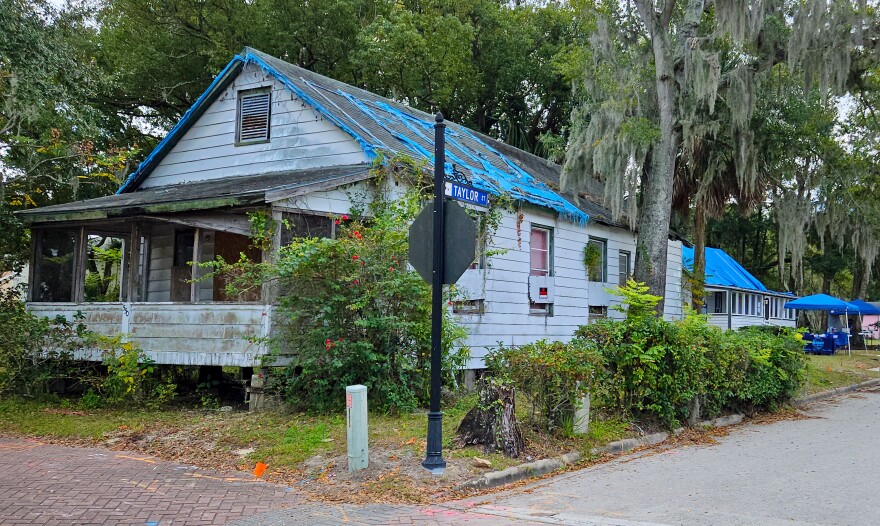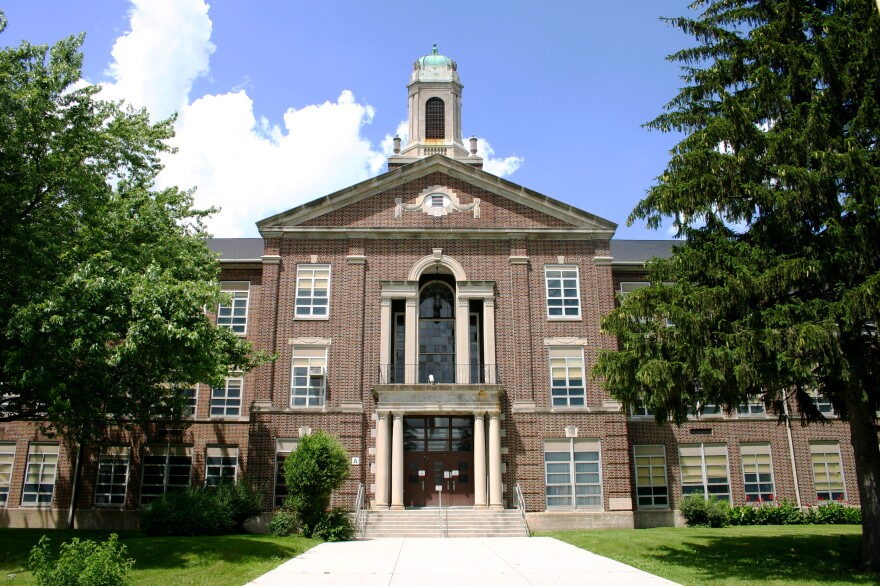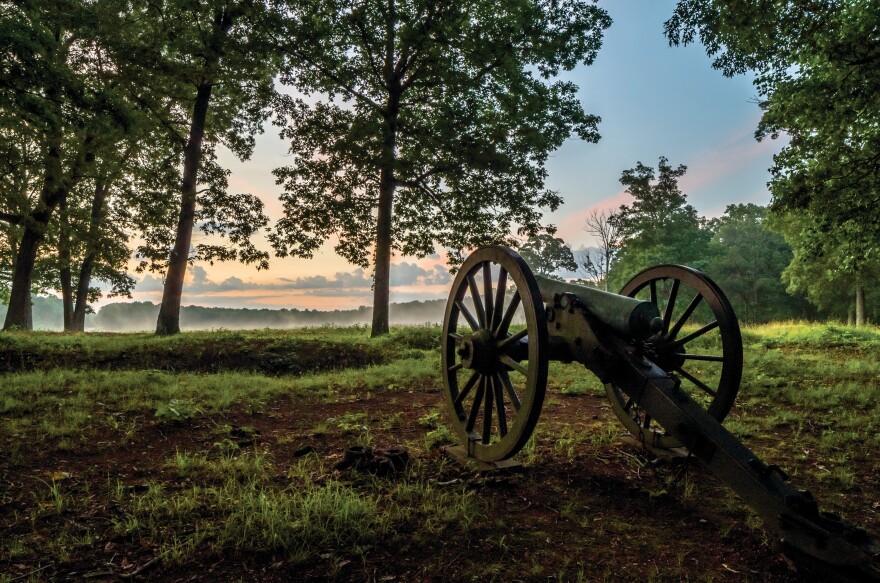There's a lonely old church in the mountains of West Virginia that holds a hidden history. Black coal miners in a segregated camp worshipped there starting in the 1920s. Now, the New Salem Baptist Church is listed as one of America's 11 most endangered historic sites.
The National Trust for Historic Preservation has released a list highlighting such places every year since 1988. Carol Quillen is the organization's new president and CEO. Trained as a historian, she was the first female president of Davidson College in North Carolina.
"I studied the past largely through texts, not places," Quillen told NPR. "And the difference between imagining one's relationship to the past through experiencing a place and reading a book in a library is really profound. So I love the way these places, which themselves hold layers and layers of stories, and invite us in the present to connect our stories to the ones these places hold."
Quillen said the push to preserve the New Salem Baptist Church came from a white Catholic woman whose father was the town's milkman. She enlisted not just the descendants of the church's original parishioners but also local ATV riders who could see and admire the church from a mountain trail.
"I love stories like that where a preservation project can mobilize folks who normally wouldn't encounter one another to work together on something significant to all of them," Quillen said. "And in that work, transform what the place can mean."
Black residents of Eatonville, Fla., have been trying to preserve their hometown for decades. One of the first self-governing all-Black towns in the United States, Eatonville was immortalized in the classic 1937 novel Their Eyes Were Watching God by Zora Neale Hurston. The legendary Harlem Renaissance writer and anthropologist once described her hometown as "the city of five lakes, three croquet courts, 300 brown skins, 300 good swimmers, plenty guavas, two schools and no jailhouse."

In a 2015 NPR story reported by Renata Sago, residents dreamed of an Eatonville reborn as a year-round heritage destination and remembered it as a refuge during the days of Jim Crow.
"We didn't lock our doors and kids could go out and play," recalled an elderly resident, Maye Saint Julian. "And everybody knew everybody. And all of these people that we honor so — James Brown, B.B. King, Lionel Hampton — these people came to Eatonville on a regular basis."

Ideally, Eatonville and many other sites on the list, such as the Cindy Walker House, could eventually become better-known cultural destinations. Located in Mexia, Texas, the ramshackle white frame structure was where a remarkable, unsung figure in country music lived for many years. Walker was one of the few female songwriters of her era. She wrote country standards and number one hits for Roy Orbison, Merle Haggard, Elvis Presley and more.

After she died in 2006, Walker's house was left abandoned. A handful of fans and heirs formed a foundation in her honor and purchased it in 2022.
"They found all kinds of things there," Quillen said. "They found her typewriter. They found her country music awards. They found songs that no one had ever heard before." One of those songs was a lost demo, called "Tennessee Rain," that can be heard in the audio version of this story.

Over the past three decades, the National Trust has seen some triumphs with its annual list of endangered places. Dozens of them have been saved, including the Antietam National Battlefield in Maryland, which narrowly missed becoming the site of a shopping mall, and Little Rock Central High School, where young Arkansas students helped overturn a legacy of legal segregation in 1957.
Now established by Congress as a National Historic Site, it's still a working public high school and a center for education about the country's civil rights.
"We don't want to spray these sites with ScotchgarEd, you know, and roll them off," Quillen said. "We really want to reinvigorate them so that they're active, exciting places for people to go so that they can continue to bring people together now and long into the future."
Here are the rest of the endangered historic places on the list this year:

Estate Whim Museum, Frederiksted, St. Croix, U.S. Virgin Islands: "Established during the colonization of St. Croix by Denmark, Estate Whim was a plantation producing cotton and sugar for export. The lives and legacies of those enslaved by plantation owners and those who continued to labor there for meager wages for a century after emancipation are inextricably tied to the site, which now hosts a museum, library and archives, and public programming. Repeated hurricanes have damaged many of Estate Whim Museum's historic buildings and structures."
Hudson-Athens Lighthouse, Athens, N.Y.: "Opened in 1874, the Hudson-Athens Lighthouse used to be one of several 'middle-of-the-river' lighthouses on the Hudson River. Now, it's one of only two left standing. However, due to erosion and other preservation challenges, engineering reports indicate the building is at risk of collapse within three years if no action is taken."

Little Tokyo, Los Angeles, Calif.: "Little Tokyo is one of only four remaining Japantowns in the United States and one of the oldest neighborhoods in Los Angeles, but its unique character is endangered by large-scale development and transit projects and displacement of legacy businesses and restaurants."

Minute Man National Historical Park, Walden, and nearby landmarks, Massachusetts: "Minute Man National Historical Park and the nearby areas of Concord, Lexington, Lincoln, and Bedford are home to places of great significance in American history, including Walden Pond and Woods and the preserved homesteads of authors and environmentalists: Little Women's Louisa May Alcott, Nathaniel Hawthorne, Ralph Waldo Emerson, and Henry David Thoreau. A proposed major expansion of nearby Hanscom Field airport could significantly increase private jet traffic, leading to increased noise, vehicular traffic, and negative environmental and climate impacts."

Roosevelt High School, Gary, Ind.: "Theodore Roosevelt High School in Gary was built in 1930 specifically to serve the educational needs of Black Americans and has graduated notable alumni including professional athletes, well-known actors, and members of The Jackson 5. The school has been unoccupied and deteriorating since 2019."


Sitka Tlingit Clan Houses, Sitka, Alaska: "The Sitka Tlingit Clan Houses in southeast Alaska are critically important to both the history and the future of the Lingít (commonly spelled in English as "Tlingit"). For many years, the matrilineal clan structure of multigenerational extended families living together in clan houses was discouraged in favor of the Western practice of living with nuclear families. Today, only eight of the original 43 clan houses remain and even fewer still function as clan houses in the traditional way."

Tangier American Legation, Tangier, Morocco: "In 1821, the Tangier American Legation in Morocco was gifted to the United States by the Moroccan Sultan as a token of friendship, becoming the first American public property located abroad, and subsequently served as a U.S. diplomatic mission for a record 140 years. Now a cultural center, museum, and research library, the Legation is in urgent need of structural stabilization and repairs following the recent collapse of an adjacent building."

Wilderness Battlefield Area, Orange County, Va.: "The Battle of the Wilderness marked a pivotal turning point in the Civil War, but today, not all the historically significant landscape is protected. Proposed large new developments, including millions of square feet of industrial data centers and thousands of homes, may negatively impact important historic sites and landscapes and degrade the visitor experience."
Copyright 2024 NPR




